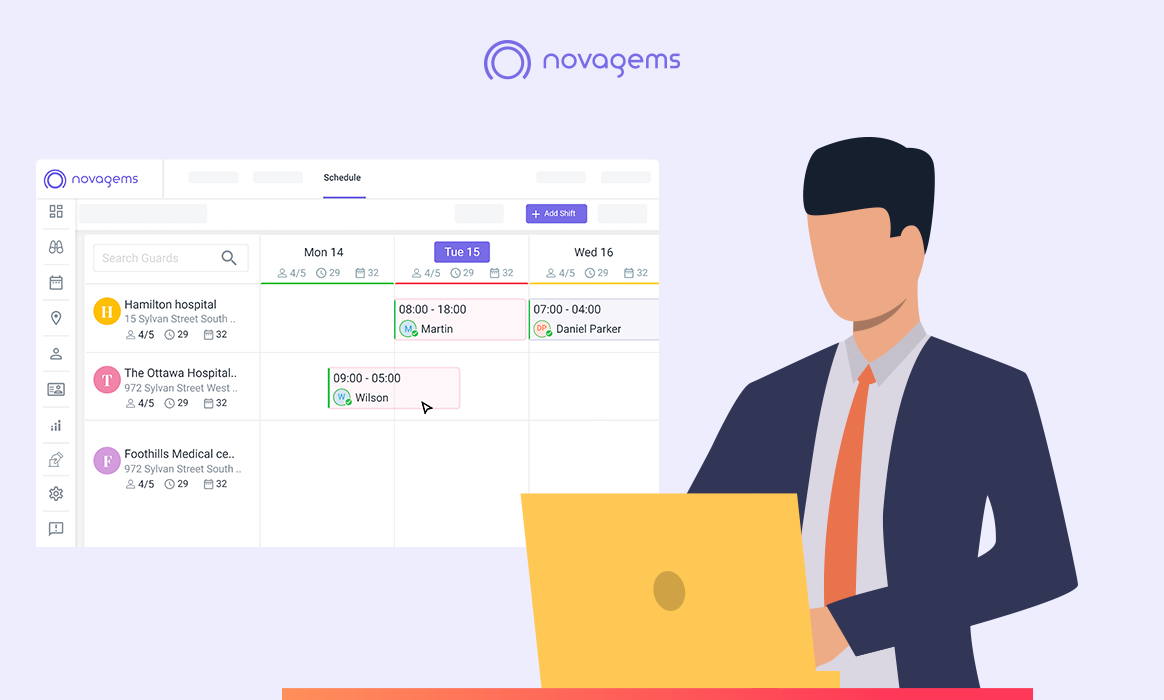The Healthcare Manager's Guide to Rotating Shifts
Thu, Sep 21, 2023
Read in 8 minutes
Step into the world of healthcare management with our in-depth guide on handling rotating shifts. Dive into practical solutions for shift scheduling and staffing challenges, ensuring your medical facility runs smoothly.

Healthcare managers are tasked with the responsibility of ensuring that the right staff members are available at the right times to provide optimal patient care. This guide explores the intricacies of managing rotating shifts and staffing in the healthcare industry, offering valuable insights and solutions for healthcare managers.
Rotating shifts are a common practice in the healthcare industry. They allow healthcare organizations to provide 24/7 coverage, but they can also be challenging for healthcare workers. And Shift scheduling, if done correctly will be a life saver.
As a healthcare manager, it is important to understand the benefits, challenges, and best practices for managing rotating shifts. You should also be able to provide your employees with the support they need to adjust to this type of work schedule.
What Are Rotating Shifts?
Rotating shifts are a way of organizing work schedules, especially in jobs that need to run all day and night, like hospitals or factories. Instead of everyone working the same hours every day, employees take turns working during the daytime, evening, and nighttime. Hence, the invention of healthcare rotating shifts.
There are several benefits to using rotating shifts. First, they allow businesses to provide 24/7 coverage without having to hire additional staff. Workforce management is the increasing need of healthcare workers as they are already overworked and need to take care of their health as well. If the employees are burned out, then they will not be able to provide adequate coverage and care for the patients.
This can be a valuable benefit, especially in industries where there is a limited pool of workers. Second, rotating shifts can help to improve efficiency by ensuring that there are always enough staff on hand to meet the needs of customers or patients. Third, rotating shifts can help to reduce costs by minimizing overtime pay and absenteeism. Hospital staff scheduling when it was done manually it used to create many issues and problems due to human error.
Rotating shifts help organizations keep going around the clock. But it can be tough on employees’ sleep patterns and personal lives, so it’s important for employers to manage it carefully and make sure their workers stay healthy and rested. If you do proper Shift scheduling then you will have the data and know which employee to schedule when and give appropriate days of rest in between.
Benefits Of Rotating Shifts For Healthcare Workers
Rotating shifts can offer several benefits for healthcare workers when implemented thoughtfully and effectively. Hospital staff scheduling has made some significant advancement in the healthcare industry. Here are some of the advantages:
Continuous Patient Care:
In healthcare, patients require round-the-clock care, and rotating shifts ensure that there are always healthcare professionals available to provide that care, no matter the time of day or night. Shift scheduling keeps a check that adequate staffing is available at all times.
Variety In Work Experience:
Rotating shifts allow healthcare workers to gain experience across different shifts and departments. This exposure can lead to a broader skill set and a deeper understanding of various aspects of patient care. Hospital staff scheduling allows the bandwidth to experience different sectors in the organization and gain a broader understanding. Rotating shifts in healthcare give ample opportunity to learn and grow.
Work-Life Balance:
While rotating shifts can be challenging, they can also provide opportunities for better work-life balance. Depending on the schedule, healthcare workers may have more flexibility to accommodate personal responsibilities and appointments. Rotating shifts in healthcare gives the healthcare providers enough time to work in the night shift and have their work done in the day and enjoy their lives as well.
Reduced Burnout Risk:
Continuous work on the same shift can sometimes lead to burnout due to monotony and fatigue. Rotating shifts can help prevent burnout by changing the work environment and responsibilities regularly.
Increased Job Satisfaction:
Some healthcare workers find rotating shifts more engaging and stimulating because they get to work with different teams, handle various cases, and face diverse challenges. Rotating shifts in healthcare is seen as beneficial by healthcare professionals and increases their morale towards work.
Higher Compensation:
In some healthcare settings, employees who work non-standard shifts may receive additional compensation, such as shift differentials or overtime pay, which can increase their overall earnings. This increases job satisfaction and overall customer satisfaction as well.
Equal Distribution Of Undesirable Shifts:
When rotating shifts are implemented fairly, all team members share the responsibility of working less desirable shifts (e.g., night shifts, weekends). This can promote a sense of equity among healthcare workers. Workforce management keeps a check on the schedules and workload of the employees. If any healthcare provider is under the stress of handling difficult shifts all the time, it can be changed immediately.
Career Advancement:
Exposure to different shifts and responsibilities can be valuable for career development. Healthcare workers who gain a wide range of experiences may become more attractive candidates for promotions or specialized roles.
Team Cohesion:
Working on different shifts can lead to stronger team dynamics. Healthcare professionals often build strong bonds with their colleagues, regardless of the shift they work, which can enhance teamwork and collaboration. Workforce management brings teams closer together as they can easily collaborate and make decisions that work in the best interest of everyone.
Challenges Of Rotating Shifts For Healthcare Workers
While rotating shifts offer numerous benefits, they also present challenges that healthcare managers must address:
1. Staffing Challenges
Managing staffing levels during different shifts can be challenging. Healthcare managers must have effective systems in place to ensure that each shift is adequately staffed. Hospital staff scheduling is not as easy as it sounds if you do not have an effective management software at your leverage. A good Workforce management software will make you aware of the employees that are available and the healthcare providers which are not.
2. Communication
Effective communication among staff working on different shifts is crucial for continuity of care. Healthcare managers can leverage technology and regular team meetings to address this challenge. The main challenge healthcare rotating shifts face is communication. Imagine a scenario where one night you are working with one employee and the next day their shift is changed. You will have to communicate with the new worker that comes in their place and that can get tiresome.
3. Negative Impact On Sleep Pattern
Although rotating shifts are beneficial and mostly loved by healthcare professionals. There are some negative implications on the sleep schedules of the healthcare professionals. It might be easy and seem like the perfect arrangement but having to handle night shift for days and then shifting to day shift will take some time to adjust.
How To Manage Rotating Shifts In Healthcare
Managing rotating shifts in a healthcare setting can be challenging but is crucial for ensuring continuous patient care and staff well-being. Having a proper and effective Workforce management tool at your disposal will be beneficial in Effective shift planning as it provides a wide range of features that can take a huge burden off the shoulders of the management.
Clear Communication:
- Establish open and transparent communication channels to keep all staff members informed about the rotating shift schedule.
- Conduct regular team meetings or huddles to discuss upcoming schedule changes, address concerns, and gather feedback from healthcare workers.
- Make the employees understand the advantages of effective shift planning and how it will benefit them.
Scheduling Software:
- Invest in scheduling software specifically designed for healthcare settings. These tools can help automate shift scheduling, ensure proper coverage, and minimize scheduling conflicts.
- Use scheduling software to consider staff preferences and availability when creating shift rotations.
- An efficient workforce management system will not only provide some selective features, it will be a complete package of the tools you are looking for.
Balanced Shifts:
- Strive for fairness in shift assignments by distributing less desirable shifts, such as night shifts or weekends, evenly among all team members.
- Consider implementing a rotation system with effective shift planning that ensures each healthcare worker experiences various shifts over time.
- Whenever changes are done in healthcare rotating shifts the employees must be made aware of it beforehand so that they can plan accordingly.
Regular Feedback:
- Create a culture of continuous improvement by regularly seeking feedback from healthcare workers about the effectiveness of the rotating shift schedule.
- Use feedback to make adjustments and address any issues or concerns promptly.
- Always make your employees feel included and if they are finding it harder to understand the benefits of rotating shifts for healthcare workers have a counseling session with them that will help them in understanding the benefits better.
Novagems Helps You Streamline The Process
Sure, healthcare rotating shifts may seem difficult to handle but they are not impossible to tackle. Novagems allows you to streamline the process of rotating shifts in such a way that you will not feel like ripping your hair out!
Scheduling Made Simpler!
Novagems is an all in one scheduling software that will assist you in making schedules in minutes. You can create the shift schedule, assign employees to shifts, and set it to repeat as often as needed with a simple copy paste.
Even within shifts, there are many features. After the shifts are made, you can assign “job duties” for task management so that you can see what the employees are scheduled to do during their shift hours. And you can even color code the shifts.
With the checklist feature in Novagems you will feel like Hospital staff scheduling is easier and alloting the duties and keeping a record for it is made manageable. You can include the full list of duties or just some simple reminders the healthcare providers need to know during the shift. Once the schedule is published, the employees will be sent an instant notification no matter where they are. And they can assess the schedule on their mobile phone or through the web version as well.
Get a Free Trial
Sign up For Newsletter
Latest Blog Posts
Get Started
Start being productive & grow your business
with Novagems




